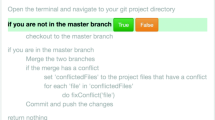Abstract
Allowing subject matter experts to directly contribute their domain knowledge and expertise to software through DSLs and automation is a promising way to increase overall software development efficiency and the quality of the product. However, there are doubts of whether this will force subject matter experts to become programmers. In this paper I answer this question with “no”. But at the same time, subject matter experts have to learn how to communicate clearly and unambiguously to a computer, and this requires some aspects of what is traditionally called programming. The main part of this paper discusses what these aspects are and why learning these does not make people programmers.
Access this chapter
Tax calculation will be finalised at checkout
Purchases are for personal use only
Similar content being viewed by others
References
Dutch Tax and Customs Administration. Challenges of the Dutch tax and customs administration (video) (2018). https://www.youtube.com/watch?v=_-XMjfz3RcU
Denning, P.J., Tedre, M.: Computational Thinking. MIT Press, Cambridge (2019)
Hermans, F.: Hedy, a gradual programming language (2020). https://hedy-beta.herokuapp.com/
itemis AG. The business DSL: Zurich insurance (2019). https://blogs.itemis.com/en/the-business-dsl-zurich-insurance
Markus Voelter, Y.K.: Streamlining der Steuersoftware-Entwicklung bei DATEV mittels Domänenspezifischer Sprachen (slides). In: OOP Conference 2021 (2021). http://voelter.de/data/presentations/oop2021-steuerDSLStreamlining.pdf
Markus Voelter, Y.K.: Streamlining der Steuersoftware-Entwicklung bei DATEV mittels Domänenspezifischer Sprachen (Video). In: OOP Conference 2021 (2021). https://youtu.be/q56wzLQkEho
Stotz, N., Birken, K.: Migrating insurance calculation rule descriptions from word to MPS. In: Bucchiarone, A., Cicchetti, A., Ciccozzi, F., Pierantonio, A. (eds.) Domain-Specific Languages in Practice, pp. 165–194. Springer, Cham (2021). https://doi.org/10.1007/978-3-030-73758-0_6
Voelter, M.: Fusing modeling and programming into language-oriented programming. In: Margaria, T., Steffen, B. (eds.) ISoLA 2018. LNCS, vol. 11244, pp. 309–339. Springer, Cham (2018). https://doi.org/10.1007/978-3-030-03418-4_19
Voelter, M.: Programming basics: how to think like a programmer (2018). https://markusvoelter.github.io/ProgrammingBasics/
Voelter, M.: Why DSLS? A collection of anecdotes (2020). https://www.infoq.com/articles/why-dsl-collection-anecdotes
Voelter, M., et al.: Using language workbenches and domain-specific languages for safety-critical software development. Softw. Syst. Model. 18(4), 2507–2530 (2019)
Voelter, M., Koščejev, S., Riedel, M., Deitsch, A., Hinkelmann, A.: A domain-specific language for payroll calculations: an experience report from DATEV. In: Bucchiarone, A., Cicchetti, A., Ciccozzi, F., Pierantonio, A. (eds.) Domain-Specific Languages in Practice, pp. 93–130. Springer, Cham (2021). https://doi.org/10.1007/978-3-030-73758-0_4
Voelter, M.: The design, evolution, and use of KernelF. In: Rensink, A., Sánchez Cuadrado, J. (eds.) ICMT 2018. LNCS, vol. 10888, pp. 3–55. Springer, Cham (2018). https://doi.org/10.1007/978-3-319-93317-7_1
Acknowledgements
Thanks to Yulia Komarov and Federico Tomassetti for providing feedback on an earlier version of this paper, as well as the anonymous reviewers of the ISOLA 2021 conference.
Author information
Authors and Affiliations
Corresponding author
Editor information
Editors and Affiliations
Rights and permissions
Copyright information
© 2021 Springer Nature Switzerland AG
About this paper
Cite this paper
Voelter, M. (2021). Programming vs. That Thing Subject Matter Experts Do. In: Margaria, T., Steffen, B. (eds) Leveraging Applications of Formal Methods, Verification and Validation. ISoLA 2021. Lecture Notes in Computer Science(), vol 13036. Springer, Cham. https://doi.org/10.1007/978-3-030-89159-6_26
Download citation
DOI: https://doi.org/10.1007/978-3-030-89159-6_26
Published:
Publisher Name: Springer, Cham
Print ISBN: 978-3-030-89158-9
Online ISBN: 978-3-030-89159-6
eBook Packages: Computer ScienceComputer Science (R0)




